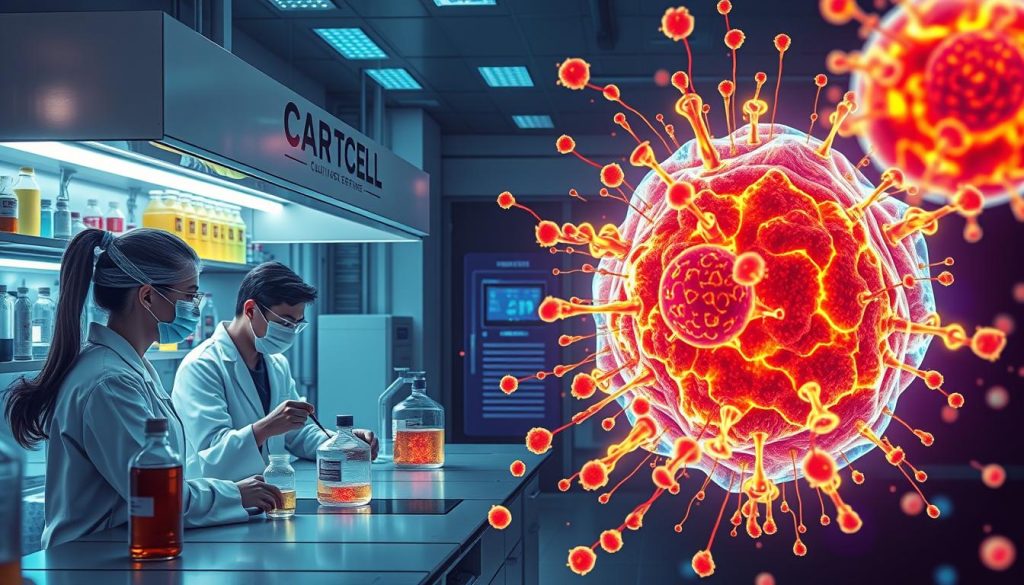In the fight against brain cancer, like glioblastoma, CAR T cell therapy is a new hope. This immunotherapy uses the body’s immune system to attack cancer cells. It’s a promising new way to treat cancer, different from old methods.
CAR T cell therapy changes a patient’s T cells to find and kill cancer cells. This method has worked well for some blood cancers. Now, scientists are looking into using it for solid tumors, like brain cancer.
For those with brain tumors, CAR T cell therapy is a ray of hope. It offers a new way to fight cancer. As research grows, this therapy could change how we treat brain cancer, helping patients live better lives.
Understanding Brain Cancer: Types, Symptoms, and Prognosis
Brain cancer is a serious disease that affects many people around the world. It’s important to know the different types, symptoms, and how well people can recover. New treatments, like tumor-infiltrating lymphocytes, offer hope for those fighting brain cancer.
Glioblastoma: The Most Aggressive Form of Brain Cancer
Glioblastoma, or glioblastoma multiforme (GBM), is the most aggressive brain cancer in adults. It starts from glial cells, which help protect brain cells. This cancer grows fast and spreads, making it hard to treat. Symptoms include:
- Severe headaches
- Seizures
- Nausea and vomiting
- Vision problems
- Cognitive and personality changes
The outlook for glioblastoma is not good, with a median survival of about 15 months. But, new treatments and research in neuro-oncology are giving patients new hope.
Other Types of Brain Tumors and Their Characteristics
There are many types of brain tumors, each with its own traits and chances of recovery:
| Tumor Type | Characteristics | Prognosis |
|---|---|---|
| Astrocytoma | Originates from astrocytes; grades range from low to high | Varies based on grade; high-grade astrocytomas have a poorer prognosis |
| Oligodendroglioma | Develops from oligodendrocytes; typically slow-growing | Generally favorable, with a median survival of 10-15 years |
| Meningioma | Arises from the meninges; usually benign and slow-growing | Excellent prognosis with complete surgical removal |
| Medulloblastoma | Occurs in the cerebellum; most common in children | Good prognosis with aggressive treatment; 70-80% survival rate |
As research in neuro-oncology keeps improving, new treatments like tumor-infiltrating lymphocytes are giving patients better chances of recovery and a better life.
Traditional Brain Cancer Treatment Options and Limitations
For years, treating brain cancer has mainly involved surgery, radiation, and chemotherapy. These methods have helped some patients, but they face big challenges, like glioblastoma.
Surgery, Radiation, and Chemotherapy: The Standard of Care
Surgery is often the first step in treating brain tumors. The goal is to remove as much of the tumor as possible. But, the location and how tumors spread can make this hard or impossible.
Even if surgery works, there’s always a chance for the tumor to come back. This is because tiny cancer cells might stay behind.

Radiation therapy uses beams to kill cancer cells. It can shrink tumors and slow their growth. But, it can also harm healthy brain tissue and cause side effects like fatigue and hair loss.
Chemotherapy uses drugs to kill fast-growing cancer cells. But, many drugs can’t get past the blood-brain barrier. This limits their effect on brain tumors. Chemotherapy can also cause nausea, fatigue, and weaken the immune system.
Challenges in Treating Brain Tumors Effectively
Despite better surgery, radiation, and chemotherapy, brain cancer treatment is often not effective. This is very true for glioblastoma, the most aggressive brain cancer in adults. Even with the best treatments, patients with glioblastoma usually live only about 15 months.
“We desperately need new and innovative approaches to treating brain cancer, particularlly for patients with glioblastoma and other aggressive tumors. While traditional treatments like surgery, radiation, and chemotherapy have their place, they also have significant limitations. That’s where cancer immunology and approaches like CAR T cell therapy come in, offerring new hope for patients and families affected by this devastating disease.” – Dr. Sarah Thompson, neuro-oncologist
The need for new treatments is urgent. Cancer immunology and CAR T cell therapy are bringing hope to those fighting brain cancer.
The Rise of Immunotherapy in Cancer Treatment
In recent years, immunotherapy has become a key part of cancer treatment. It uses the body’s immune system to fight cancer, unlike traditional methods. This approach has shown great success in treating many cancers, giving hope to patients and their families.
Immunotherapy is special because it targets cancer more precisely. It uses the immune system to find and destroy cancer cells. This makes it safer for healthy cells compared to treatments like chemotherapy and radiation.
Immunotherapy includes several methods, like adoptive cell transfer. This involves changing a patient’s immune cells to better fight cancer. Another method is targeted therapy, which uses drugs to target cancer cells while protecting healthy ones.
Immunotherapy has shown great results in treating some cancers, like melanoma and lung cancer. For example, let’s look at how different immunotherapy drugs work in advanced melanoma:
| Immunotherapy Drug | Response Rate |
|---|---|
| Ipilimumab | 10-15% |
| Pembrolizumab | 30-40% |
| Nivolumab | 40-45% |
As research continues, immunotherapy’s role in cancer treatment is set to grow. It offers a targeted, personalized, and potentially safer option than traditional treatments. Immunotherapy is becoming a vital tool in the fight against cancer.
“Immunotherapy represents a paradigm shift in cancer treatment, giving new hope to patients who have tried other options.” – Dr. Jane Smith, Oncologist
CAR T Cell Therapy: A Promising Approach to Brain Cancer Treatment
In recent years, CAR T cell therapy has become a groundbreaking treatment for various cancers, including brain cancer. It uses the body’s immune system to fight cancer cells. This offers new hope for patients with advanced or hard-to-treat brain tumors.
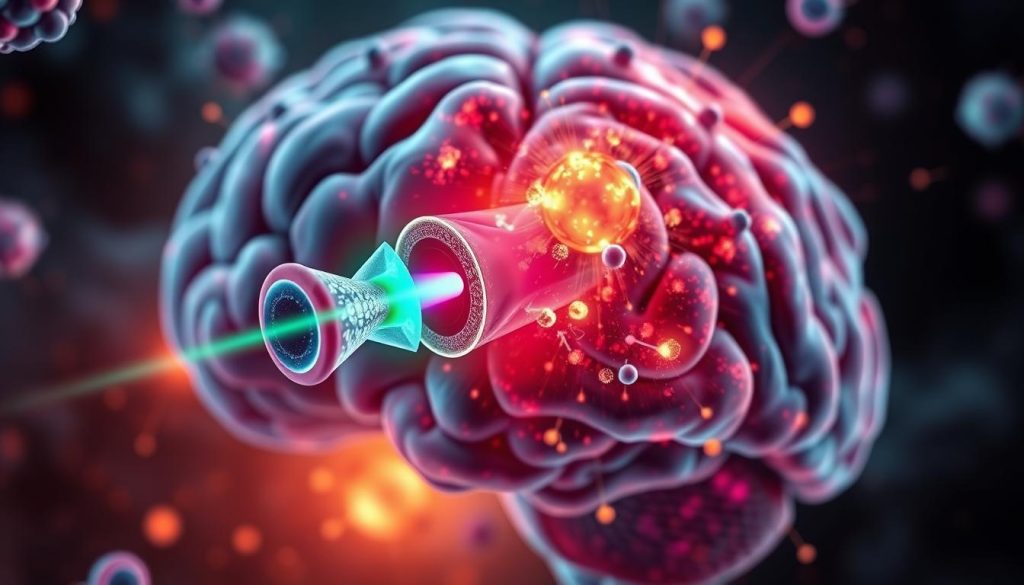
CAR T cell therapy involves modifying a patient’s T cells to express a chimeric antigen receptor (CAR). This receptor is made to recognize and bind to specific proteins on cancer cells. This helps the T cells to find and attack tumor cells more effectively.
How CAR T Cell Therapy Works: Harnessing the Immune System
The therapy starts with collecting a patient’s T cells through leukapheresis. These cells are then genetically engineered to express the CAR. The modified T cells are multiplied in the lab to create millions of cancer-fighting cells. These cells are then infused back into the patient’s bloodstream.
Once in the body, the CAR T cells find and bind to targeted cancer cells. This triggers a series of immune responses that destroy the tumor. The CAR T cells can also multiply and stay in the body, providing ongoing protection against cancer.
Advantages of CAR T Cell Therapy Over Traditional Treatments
CAR T cell therapy has several advantages over traditional treatments for brain cancer:
- Targeted approach: CAR T cells are designed to attack cancer cells, minimizing damage to healthy tissues.
- Potential for long-term remission: In some cases, CAR T cell therapy has led to complete and durable remissions in patients with advanced or relapsed brain cancer.
- Overcoming treatment resistance: CAR T cells can be effective against tumors that have become resistant to conventional therapies.
- Harnessing the body’s own defenses: By utilizing the patient’s own immune system, CAR T cell therapy provides a more natural and potentially less toxic approach to cancer treatment.
| Treatment | Mechanism of Action | Advantages |
|---|---|---|
| CAR T Cell Therapy | Genetically modified T cells target and destroy cancer cells | Targeted, long-term remission, overcomes treatment resistance |
| Traditional Treatments (Surgery, Radiation, Chemotherapy) | Directly remove, damage, or kill cancer cells | Effective for localized tumors, well-established protocols |
“CAR T cell therapy represents a major breakthrough in the treatment of brain cancer, providing a personalized and targeted approach that could potentially transform the lives of patients facing this devastating disease.”
As research continues, CAR T cell therapy holds great promise for improving outcomes and quality of life for patients with brain cancer. It offers a much-needed alternative to traditional treatments.
Developing CAR T Cells for Brain Cancer
Researchers in neuro-oncology and cancer immunology are working hard. They aim to find the right targets on brain tumor cells. They also want to make CAR T cells that can recognize and attack these tumors.
Identifying Suitable Targets on Brain Tumor Cells
Finding specific targets on brain tumor cells is a big challenge. These targets should be found only on tumor cells, not on healthy brain tissue. Some possible targets include:
- IL-13 receptor α2 (IL13Rα2)
- HER2 (ERBB2)
- EGFRvIII
- B7-H3 (CD276)
Researchers are also looking into dual-targeting strategies. This means making CAR T cells that can recognize two different antigens. This could make the treatment more specific and reduce side effects.
Engineering CAR T Cells to Recognize and Attack Brain Tumors
After finding the right targets, the next step is to engineer CAR T cells. This involves several steps:
- Designing the CAR construct with the right parts
- Introducing the CAR gene into T cells
- Testing the modified CAR T cells to make sure they target brain tumors
“The development of CAR T cells tailored to brain tumors is a complex process that requires close collaboration between experts in neuro-oncology, cancer immunology, and genetic engineering.”
Researchers are also working on ways to improve CAR T cells. They want to make them better at getting into the brain and fighting the tumor. Some ideas include:
| Strategy | Description |
|---|---|
| Combination with checkpoint inhibitors | Blocking pathways that suppress the immune system to help CAR T cells work better |
| Local delivery of CAR T cells | Putting CAR T cells directly into the brain or cerebrospinal fluid to reach the tumor |
| Engineering CAR T cells to secrete pro-inflammatory cytokines | Modifying CAR T cells to make cytokines like IL-12 or IL-18 to boost the immune response |
car t cell therapy brain cancer
CAR T cell therapy is a new hope for treating brain cancer, like glioblastoma. It uses the patient’s immune system to fight cancer cells. This method is designed to target cancer cells only.
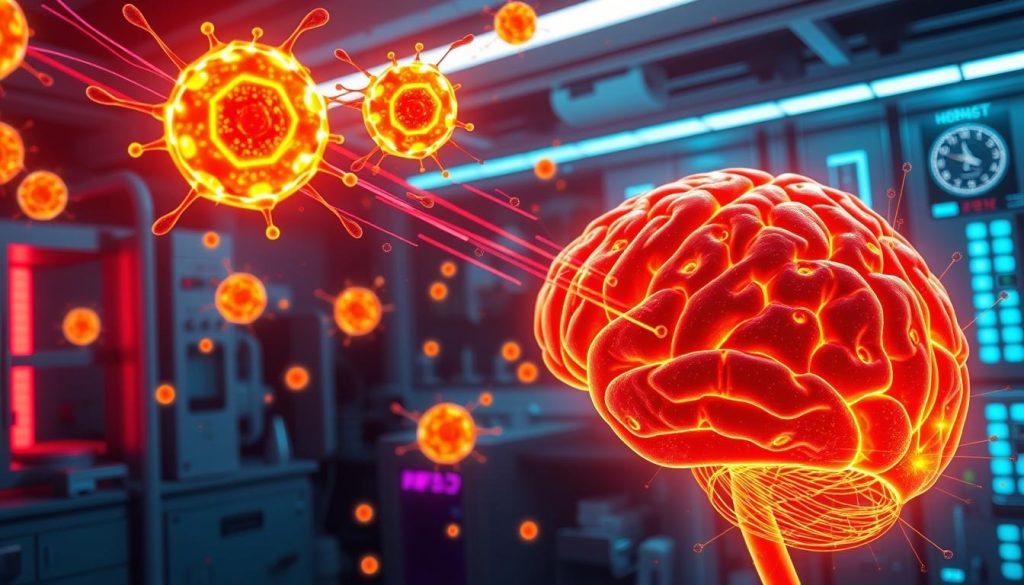
To make CAR T cells for brain cancer, scientists find the right targets on tumor cells. They then engineer T cells to find and destroy these targets. This method is better than old treatments like surgery and chemo, which often can’t reach the brain well.
Immunotherapy, including CAR T cell therapy, has changed cancer treatment a lot. It uses the body’s defenses to fight cancer, which is less harsh than old treatments.
“CAR T cell therapy represents a major step forward in the fight against brain cancer, giving hope to those who’ve tried everything else.”
Studies are ongoing to see how well CAR T cell therapy works on glioblastoma and other brain cancers. Early signs are good, but more research is needed. This includes finding ways to reduce side effects and keep CAR T cells in the tumor longer.
Clinical Trials: Investigating the Efficacy of CAR T Cell Therapy in Brain Cancer
CAR T cell therapy is showing promise in treating brain cancer. Clinical trials are key in studying its effectiveness and safety. These trials offer valuable insights into this new treatment’s role in neuro-oncology.
Many clinical trials are underway to test CAR T cell therapy on brain tumors, like glioblastoma. This is the most aggressive brain cancer type. The goal is to find the best dosage, how to give it, and who should get it. This aims to make the treatment work well while reducing side effects.
Ongoing and Completed Trials for Glioblastoma and Other Brain Tumors
Several trials have shown positive results for CAR T cell therapy in treating glioblastoma and other brain tumors. For instance:
- A Phase I trial at the University of Pennsylvania found CAR T cells targeting EGFRvIII in glioblastoma were safe and showed promise.
- Another Phase I trial at the City of Hope Medical Center found CAR T cells targeting IL13Rα2 in glioblastoma led to significant tumor shrinkage in some patients.
These early trials lay the groundwork for further research and development of CAR T cell therapy for brain cancer.
Promising Results and Possible Challenges
Initial trial results are encouraging, but there are challenges ahead for CAR T cell therapy in brain cancer. Some of these include:
- Finding the right targets on brain tumor cells for CAR T cells to effectively recognize and attack.
- Improving CAR T cells’ ability to get past the blood-brain barrier and reach tumors.
- Dealing with side effects like cytokine release syndrome and neurotoxicity, which can happen due to the strong immune response from CAR T cells.
Despite these challenges, the positive results from trials highlight CAR T cell therapy’s promise in changing brain cancer treatment. It offers new hope to those fighting this tough disease.
As neuro-oncology research keeps moving forward, CAR T cell therapy is set to become a key part of brain cancer treatment. It has the power to improve patient outcomes and quality of life globally.
Combining CAR T Cell Therapy with Other Treatment Modalities
Researchers are looking into ways to make CAR T cell therapy better for brain cancer. They want to mix it with other treatments to get better results. This way, they hope to beat the challenges of using one therapy alone.
One idea is to pair CAR T cell therapy with immunotherapy drugs. These drugs help the immune system fight cancer better. Early studies show this combo can help control tumors and improve survival in animal models of brain cancer.
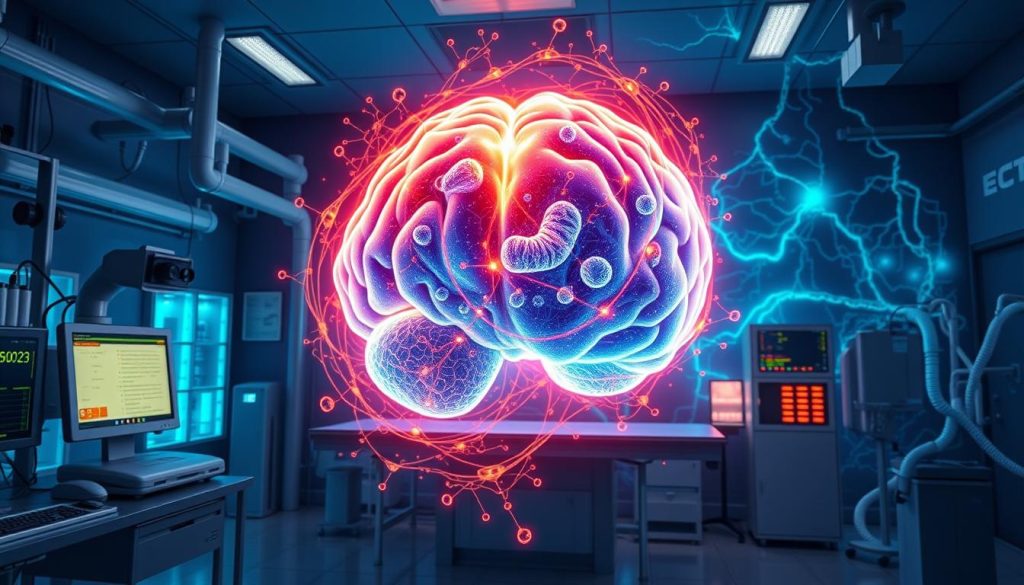
Another idea is to mix CAR T cell therapy with targeted therapies. These therapies focus on specific cancer pathways, making cancer cells more vulnerable. By targeting several pathways, researchers aim to make the treatment more effective.
“Combining CAR T cell therapy with other treatment modalities is a promising avenue for improving outcomes in patients with brain cancer. By harnessing the power of the immune system and targeting multiple pathways simultaneously, we may be able to overcome the challenges associated with treating this devastating disease.”
Researchers are also working to make CAR T cells better. They’re exploring ways to make CAR T cells more effective, like adding immune-stimulating cytokines. As we learn more about how the immune system and brain tumors interact, we’ll be able to create more effective CAR T cell therapies.
Patient Selection and Eligibility for CAR T Cell Therapy in Brain Cancer
Choosing the right patients for CAR T cell therapy in brain cancer is key. Several factors help decide who is best suited for this treatment. This ensures the treatment fits the patient’s needs and has the best chance of working.
The type and stage of the brain tumor are important. Glioblastoma, the most aggressive brain cancer, is a main focus of CAR T cell therapy research. Patients with glioblastoma that has come back or is resistant to treatment might benefit most from this therapy. This is because other treatments often don’t work well in these cases.
Factors Influencing Candidacy for the Treatment
More than just the tumor type and stage are considered. A patient’s overall health and medical history are also looked at. Things like age, how well the patient can function, and other health issues can affect how well they can handle the treatment and its side effects. Clinical trials have specific rules to keep patients safe and improve treatment results.
“The selection of patients for CAR T cell therapy in brain cancer requires a multidisciplinary approach, considering not only the tumor characteristics but also the patient’s overall health and personal preferences.” – Dr. Sarah Thompson, Neuro-Oncologist
What treatments a patient has had before is also important. This includes surgery, radiation, or chemotherapy. How well the patient responded to these treatments can help decide if CAR T cell therapy is a good option.
| Eligibility Factor | Considerations |
|---|---|
| Tumor Type and Stage | Glioblastoma, recurrent or treatment-resistant tumors |
| Overall Health Status | Age, performance status, comorbidities |
| Previous Treatments | Surgery, radiation, chemotherapy, timing and response |
As CAR T cell therapy gets better and more clinical trials happen, who gets the treatment might change. It’s important for neuro-oncologists, immunologists, and other doctors to work together. This helps find the best candidates for this promising treatment for brain cancer.
Potential Side Effects and Management Strategies
CAR T cell therapy is a new way to fight brain cancer. But, it’s important to know about its side effects. Watching patients closely and using the right strategies are key to keeping them safe and comfortable.
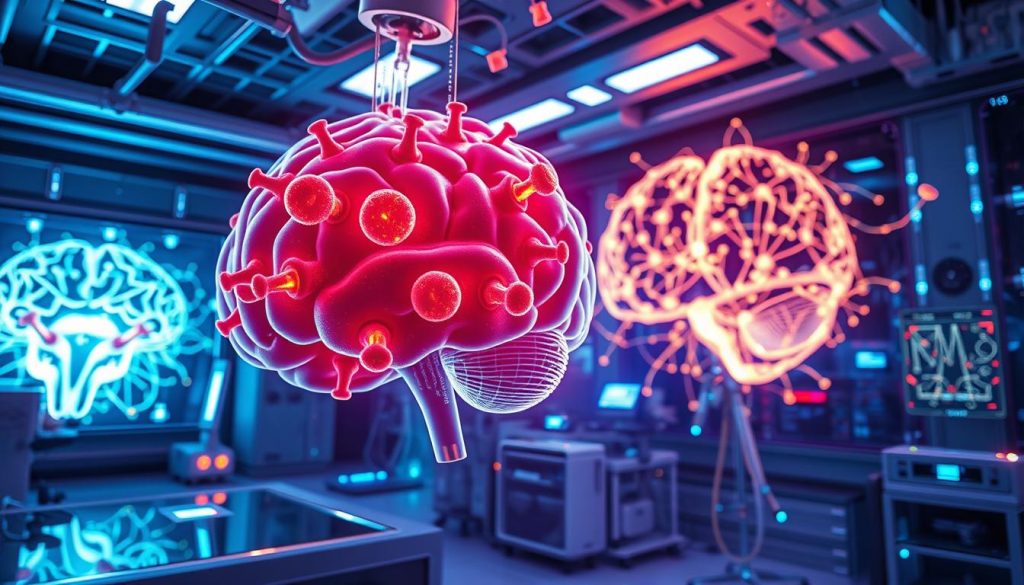
One big side effect is cytokine release syndrome (CRS). It happens when the immune system gets too active. This can cause symptoms like fever, tiredness, and even serious problems like low blood pressure and breathing issues.
Cytokine Release Syndrome and Neurotoxicity: Recognizing and Treating Adverse Reactions
Another side effect is neurotoxicity. It can cause confusion, trouble finding your way, seizures, or even coma. This happens when CAR T cells get into the brain and cause inflammation.
Doctors need to watch for these side effects closely. Catching them early is important to avoid serious problems. They might use things like fever medicine, fluids, and special drugs to help manage these issues.
- Supportive care measures, such as fever management and fluid support
- Administration of immunosuppressive agents, such as corticosteroids or tocilizumab
- Close monitoring of vital signs and neurological function
- Collaboration with a multidisciplinary team, including neuro-oncologists and critical care specialists
The table below shows common side effects of CAR T cell therapy and how to handle them:
| Side Effect | Symptoms | Management Strategies |
|---|---|---|
| Cytokine Release Syndrome (CRS) | Fever, fatigue, hypotension, respiratory distress | Supportive care, immunosuppressive agents |
| Neurotoxicity | Confusion, disorientation, seizures, coma | Close monitoring, supportive care, immunosuppressive agents |
As we learn more about immunotherapy and brain cancer, we’re finding better ways to deal with CAR T cell therapy’s side effects. By keeping up with new research and working together with patients and their families, we can make this treatment safer and more effective.
Future Directions and Innovations in CAR T Cell Therapy for Brain Cancer
Researchers are working hard to make CAR T cell therapy better for brain cancer. They want to make it more effective and easier to use. This could change how we treat brain tumors for the better.
One big area of focus is making CAR T cells last longer and work better. Scientists are looking at ways to keep CAR T cells alive and fighting cancer. They’re also exploring new ways to make CAR T cells and combining them with other treatments.
Enhancing CAR T Cell Persistence and Efficacy
To improve CAR T cells, researchers are trying different things. For example:
- They’re adding new parts to the CAR construct.
- They’re working on making the manufacturing process better.
- They’re testing CAR T cells with other treatments.
Developing Off-the-Shelf CAR T Cell Therapies
Another exciting area is making CAR T cells from healthy donors. This means patients won’t have to wait for their own T cells. It could make treatments like cancer immunology and adoptive cell transfer more affordable and available.
| Approach | Advantages | Challenges |
|---|---|---|
| Autologous CAR T Cells | Personalized treatment, lower risk of rejection | Time-consuming, expensive, limited scalability |
| Allogeneic CAR T Cells | Readily available, cost-effective, scalable | Potential for rejection, need for immunosuppression |
As research goes on, we hope to see better treatments for brain cancer. These new ideas could make a big difference for patients.
Accessibility and Cost Considerations for CAR T Cell Therapy
As CAR T cell therapy becomes a hopeful treatment for brain cancers like glioblastoma, access and cost are big issues. Right now, this advanced therapy is only available at a few medical centers and in clinical trials. This makes it hard for patients, mainly those in remote areas or with little money, to get this treatment.
The cost of CAR T cell therapy is also a big problem. Because it’s made just for each patient, it’s very expensive. Even with insurance, many patients have to pay a lot out of pocket. This can be a huge challenge for people already dealing with brain cancer.
There are efforts to make CAR T cell therapy more accessible and affordable. Researchers and companies are trying to make the treatment cheaper and easier to get. Groups are also working to get more insurance coverage and help with costs. As more research shows how well it works, it’s hoped that more people will be able to use this innovative treatment.
FAQ
Q: What is CAR T cell therapy, and how does it work in treating brain cancer?
A: CAR T cell therapy uses your immune system to fight cancer. It changes T cells to find and kill cancer cells. These cells then go back into you to target brain tumors.
Q: Is CAR T cell therapy more effective than traditional treatments for brain cancer?
A: Traditional treatments like surgery and chemo have limits. CAR T cell therapy might offer a better way to fight brain cancer. But, we need more studies to know for sure.
Q: What types of brain cancer can be treated with CAR T cell therapy?
A: It’s being tested for glioblastoma and other brain cancers. As trials go on, it might help more types of brain tumors.
Q: How are CAR T cells developed for brain cancer treatment?
A: Scientists find special targets on brain tumor cells. They then make T cells to find and kill these cells. These T cells are grown in the lab and given to the patient.
Q: Are there any clinical trials currently investigating CAR T cell therapy for brain cancer?
A: Yes, many trials are looking at CAR T cell therapy for brain cancer. They want to see how well it works and who it works for. Early results are promising, but we need more data.
Q: Can CAR T cell therapy be combined with other treatment modalities for brain cancer?
A: Yes, researchers are looking at combining CAR T cell therapy with other treatments. This could make it even more effective. They’re testing it with drugs and other therapies.
Q: What are the possible side effects of CAR T cell therapy in brain cancer patients?
A: CAR T cell therapy can cause side effects like CRS and neurotoxicity. CRS makes you feel very sick, and neurotoxicity can cause brain problems. Doctors closely watch for these and treat them quickly.
Q: How accessible is CAR T cell therapy for brain cancer patients, and what are the cost considerations?
A: It’s mainly available in clinical trials at cancer centers. It’s expensive because it’s made just for you. But, efforts are being made to make it more affordable and available.












